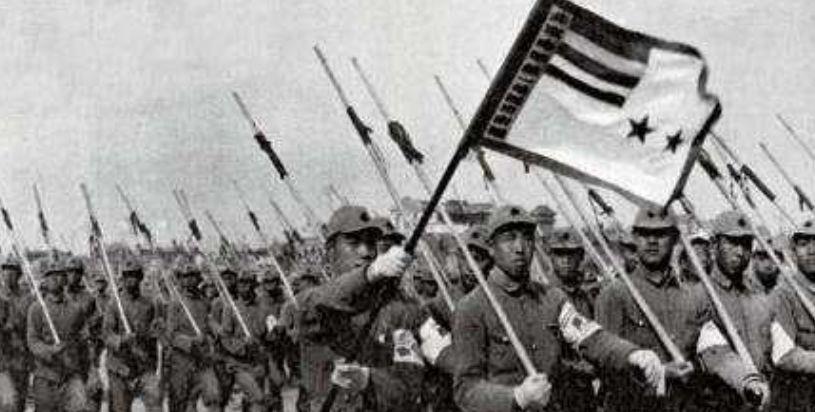During the War of Resistance Against Japanese Aggression, the relationship between the Kuomintang and the puppet army was extremely delicate, which can be felt from the words of the puppet army generals. The puppet general once told Okamura Ningji that we "are not traitors to the enemy, the Communist Party is China's rebellion, and we want to eliminate them together with the Japanese army." We are still receiving military salaries from Chongqing. If your army is going to fight the Central Army, we cannot assist. This is expected to be understood. This passage reflects the fact from the side that the anti-Japanese base areas armed resistance against the main force of the puppet army.

On August 24, 1943, Jiefang Ribao published an article entitled "Overview of All the Puppet Armies Resisted by the Communist Party of China", which pointed out: "Except for the puppet army in South China, all the puppet armies behind the enemy lines in North China and Central China were driven by the enemy and constantly cooperated with the enemy to 'sweep' and 'clear the countryside' of the Communist Party." Over the years, the puppet army participated in the frontal battlefield against the Kuomintang army, only once, that is, in the summer of 1943, the Battle of the South of Northern Hunan Province, with the participation of one of the divisions directly under the puppet Wuhan Xingying Battalion (the Twenty-ninth Division). The puppet army in North China and Central China has always lived in peace with the Kuomintang in the frontal battlefield, and actively attacked the Communist army in cooperation with the enemy. ”
On June 22, 1944, Ye Jianying, chief of staff of the Eighth Route Army, in a conversation with Chinese and foreign reporters, once again pointed out, "What role did these puppet troops play behind enemy lines, in other words, what tasks did many puppet troops undertake for the enemy?" It is roughly (1) to cooperate with the sweep: (2) to garrison the stronghold; (3) to clear the countryside; (4) to replenish the vacancy. The first three are well known. The last item, for example, since the spring of 1943, the enemy's Thirty-seventh Division has replenished three groups of puppet troops; the first batch of more than 300 people; the second batch of 1,500 people supplemented by Shijiazhuang; and the third batch has been supplemented by Xiu Jie with 3,000 people. And all these tasks are against the Communist Party. ”
Because of this, "almost all the puppet armies were pressed against the Communist Party," the CCP's armed forces resisted most of the puppet armed forces. There is power coming out of the barrel of the gun. Military strikes and victories against the enemy and hypocrisy are the prerequisites for opening up the situation in the work of resisting war and suppressing traitors, are the guarantee for the development of the work of suppressing traitors, and have a great impact on the work of resisting war and suppressing traitors. For example, when the Eighth Route Army first arrived in Gaoyang, Hebei Province, there were 600 or 700 local defense regiments, gathering some of the defeated troops, having relations with the Japanese Kou, not allowing the Eighth Route Army to enter the city, and attempting to unite with the Japanese to eliminate our army. Therefore, the Eighth Route Army took armed action against it, and after two hours of fighting, it captured Gaoyang. This victory made many those who were ready to surrender dare not surrender, and the puppet organizations were suppressed. ...... These were the necessary blows, without which the capitulating reactionary forces of the time could not be suppressed.
The puppet army's fear of the Eighth Route Army and the New Fourth Army was the result of helplessness after many heavy blows. In the first stage of the Hundred Regiments War, only 10,252 Japanese puppet troops were killed or wounded, 675 puppet troops were captured, 183 traitors were captured, and the puppet army was nine times anyway, for a total of 470. The secret service agencies along zhengtai road and the pseudo-government organizations in various places have all been eliminated by me, and many other pseudo-organizations have also been eliminated. Just as Peng Dehuai said in summing up the significance of the victory in the Hundred Regiments War, "The victory of the Hundred Regiments War also played a very important role in the enemy's theater and in the enemy's far rear.
First of all, the broad masses of the people in the enemy's theater, under the influence of the victory of the Hundred Regiments, waged a resolute struggle against the enemy, for example, along the Zhengtai Road, and this struggle continued to expand. The struggle of the broad masses of the people inside and outside the enemy's theater of operations has an extremely important bearing on the conduct of our war.
Secondly, if all the enemy and puppet organizations in the enemy's theater are even more shaken under the influence of the victory of our hundred regiments in the great battle, this will facilitate us to dismantle these puppet organizations and win over every Chinese who do not want to be slaves to the subjugated country and return to the embrace of the motherland; this will make it more difficult and more wavering for us to rule in the enemy theater, and it will be convenient for us to carry out the work of the enemy theater, expand the anti-Japanese zone, surround the enemy, and smash the conspiracy and poisonous scheme of the enemy to 'use China to control China' and 'feed the war with war.' ”
Resources
[1] "Jinchaye Anti-Japanese Base Area, Historical Materials from the Book Compilation and Review Committee: Jinchaji Anti-Japanese Base Area" (Volume III)
[2] Lou Zifang: History of the War of Resistance Against Japanese Aggression in Zhejiang